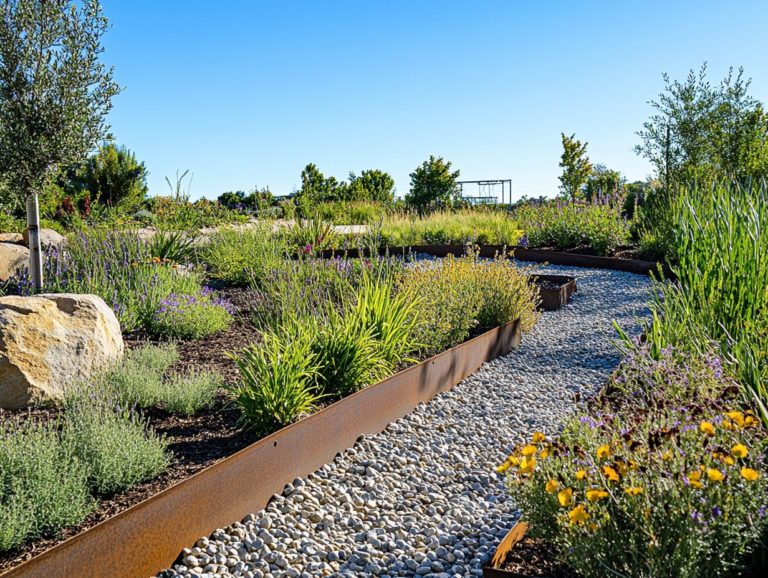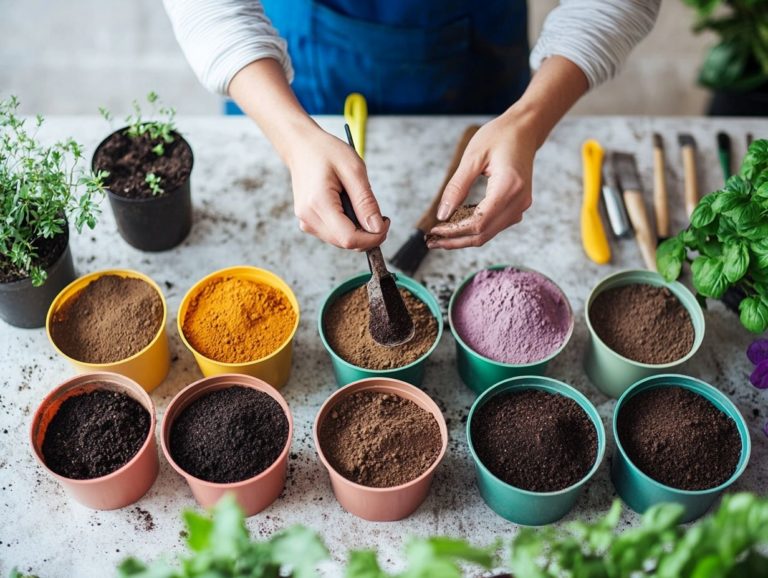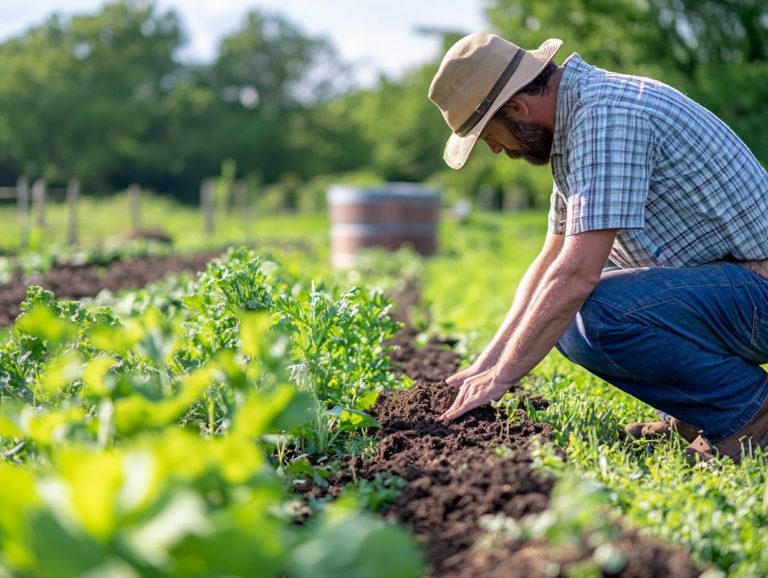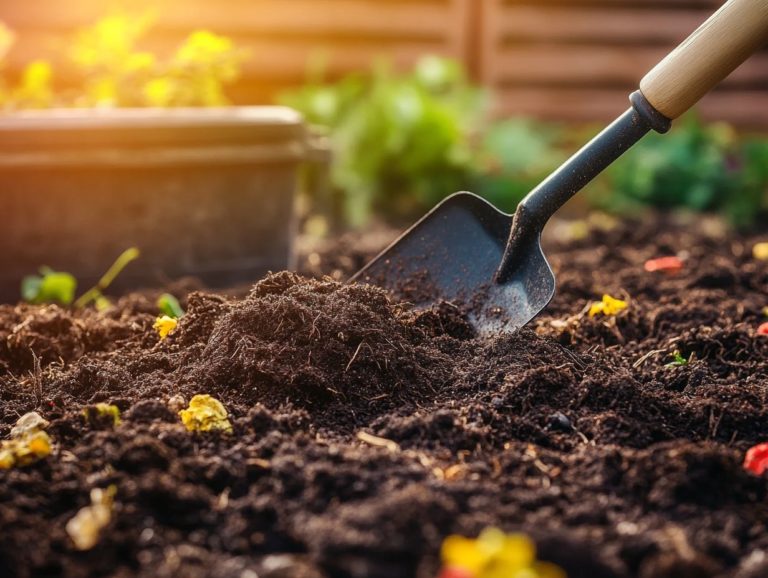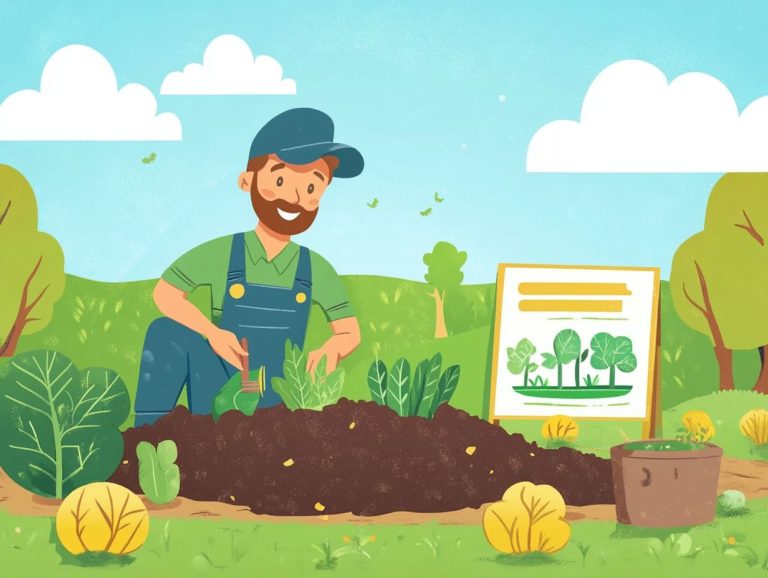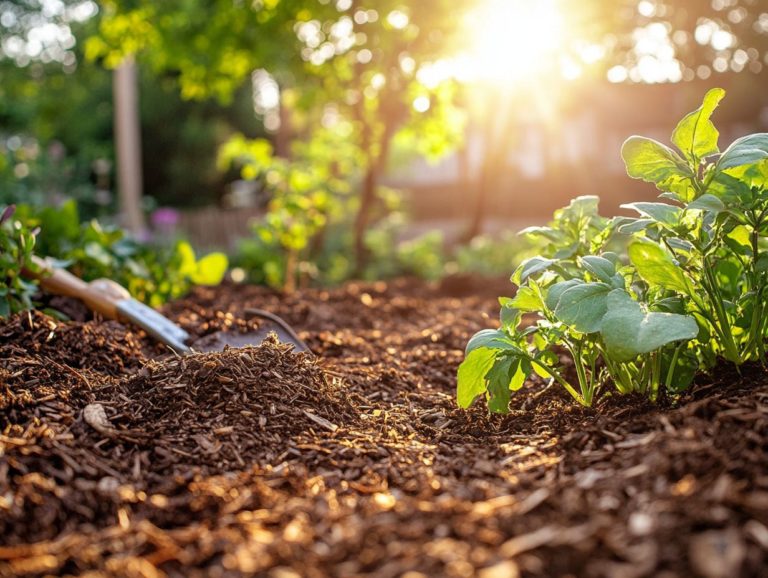5 Signs Your Soil Needs Improvement
Soil quality is fundamental to the health and vitality of your plants. When the soil is lacking, it can result in stunted growth, problematic drainage, and even unwelcome pest invasions. These issues ultimately affect your overall garden soil health.
If your plants are struggling to grow, it s a clear sign something is wrong! In this article, you ll discover five key signs indicating your soil may need attention. You’ll learn to recognize issues like discoloration, unpleasant odors, and imbalances in soil nutrients.
This article highlights why soil testing is important, the various types of soil, and effective strategies, such as mulch application, to elevate your garden s foundation. Whether you re a seasoned gardener or just beginning your journey, grasping the nuances of soil quality including soil structure and moisture retention is essential for cultivating thriving plants.
Contents
- Key Takeaways:
- 1. Poor Plant Growth
- 2. Water Drainage Issues
- 3. Presence of Weeds or Pests
- 4. Discoloration of Soil
- 5. Unpleasant Odor
- How Does Soil Quality Affect Plant Growth?
- What Are Some Common Causes of Poor Soil Quality and How to Address Them?
- What Are Some Ways to Improve Soil Quality?
- Why Is It Important to Maintain Good Soil Quality?
- Frequently Asked Questions
Key Takeaways:
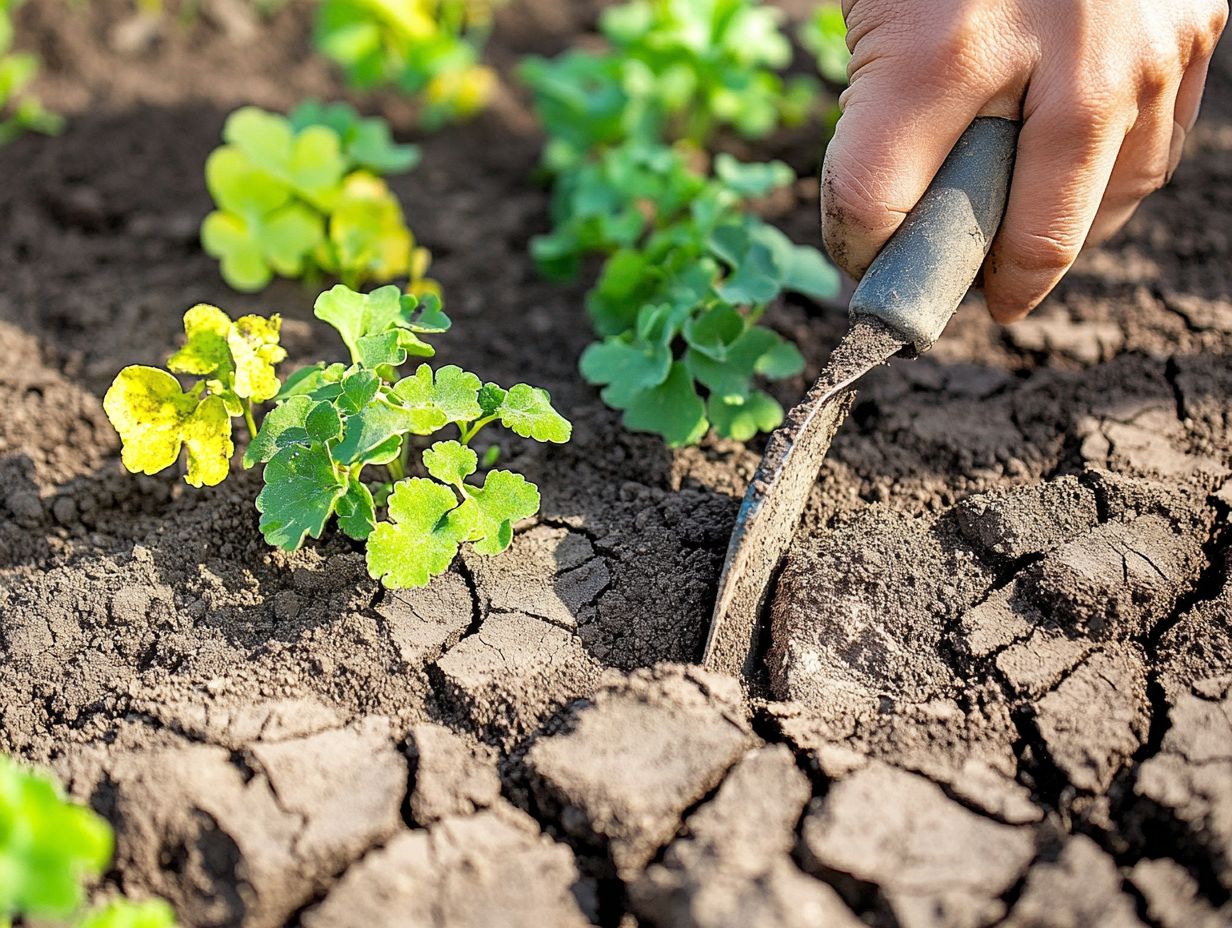
- Poor plant growth is a clear sign that your soil is not providing the necessary nutrients for plants to thrive, impacting both soil fertility and crop yield.
- Water drainage issues can lead to over-watering or waterlogged soil, suffocating plant roots and preventing proper growth, ultimately affecting soil aeration.
- The presence of weeds or pests can indicate imbalanced soil pH levels or a lack of essential nutrients, making it difficult for plants to compete in a healthy soil ecosystem.
1. Poor Plant Growth
Poor plant growth often signals deeper issues regarding soil health. The quality of your garden soil directly affects how well your plants flourish and produce optimal yields. Tackling any nutrient and organic matter deficiencies is crucial for ensuring healthy roots and optimal growth.
Several factors can contribute to these challenges. Nutrient deficiencies may limit essential elements like nitrogen, phosphorus, and potassium, which are key macronutrients for robust plant development. Soil compaction can hinder root expansion and water absorption. Additionally, the absence of beneficial microorganisms disrupts the process that helps plants access nutrients.
To combat these problems, you can implement practices such as using organic mulches and cover crops to enhance moisture retention and minimize weed competition. Composting organic matter can also enrich your soil with vital nutrients. These strategies not only improve soil structure but also cultivate a vibrant ecosystem that supports robust plant growth.
2. Water Drainage Issues
Water drainage issues frequently stem from poor soil structure and compaction. These factors greatly restrict water infiltration and can lead to soil erosion. This hampers plant roots and ultimately results in inadequate moisture retention and a decline in soil fertility, impacting overall plant growth.
Consider that compacted soil develops dense layers that water finds difficult to penetrate, leading to nitrogen leaching. This situation hinders water movement and obstructs essential air circulation to the roots, creating a less-than-ideal environment for plant growth.
You can use several effective strategies to enhance drainage and improve soil texture:
- Incorporating organic matter, such as compost or well-rotted manure, will improve soil texture and foster a more favorable environment for water movement.
- Practicing mindful soil management techniques, including crop rotation and minimal tillage, can help alleviate compaction over time.
- Utilizing cover crops is another advantageous approach; they reduce erosion and enhance soil aeration through their root systems, leading to improved drainage and overall soil health.
3. Presence of Weeds or Pests
The presence of weeds or pests in your garden can indicate hidden problems in the soil. These issues can affect both soil health and plant growth. Healthy soil should support beneficial insects and microorganisms that help with nutrient cycling and stability.
When these unwanted intruders thrive, they compete with your plants for essential nutrients and water. This competition can lead to stunted growth and disappointing harvests. Weeds block sunlight and absorb moisture, while pests damage leaves and roots.
Creating a rich soil environment encourages beneficial organisms, like earthworms, to outcompete or prey on harmful species. This ensures a balanced soil ecosystem. By using integrated pest management (a method to control pests using various strategies), you can enhance soil health and promote beneficial insects. This holistic approach not only reduces pest issues but also enriches the soil, nurturing a thriving ecosystem that supports vibrant plant growth.
4. Discoloration of Soil
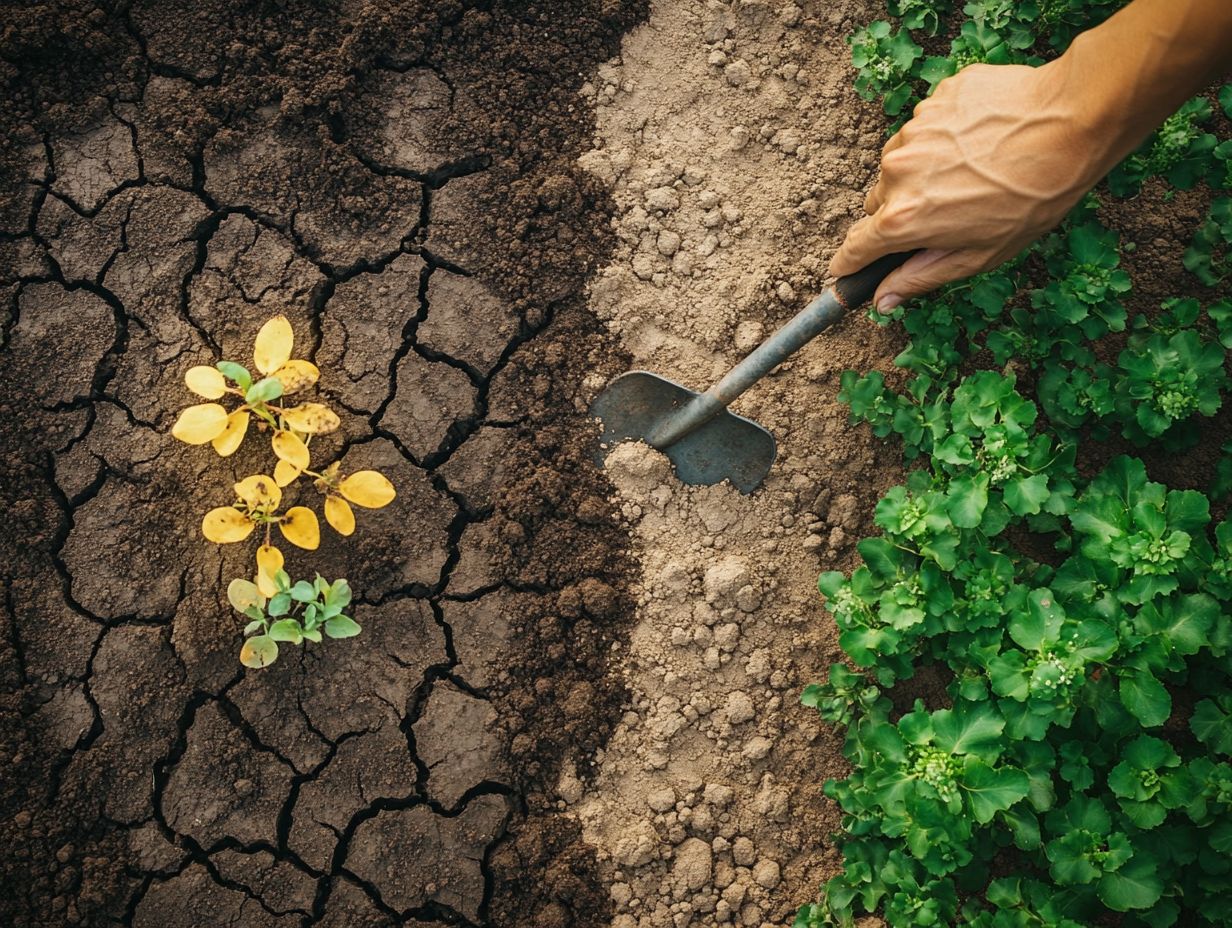
Discoloration of soil often signals underlying issues with nutrients and pH levels. Both are vital for maintaining soil fertility and encouraging vibrant plant growth. If your soil appears unnaturally dark, light, or blotchy, it may indicate a nutrient imbalance or pH fluctuations that can affect plant health.
Lacking essential nutrients like nitrogen, phosphorus, or potassium can weaken plants. Inappropriate pH levels can hinder nutrient absorption, negatively impacting soil fertility. To tackle these problems, regular soil testing is essential. It helps you assess nutrient availability and make necessary amendments.
In addition to testing, incorporating organic amendments like compost can significantly improve soil structure and nutrient content. This nurturing practice creates a healthier, more resilient ecosystem for your plants.
5. Unpleasant Odor
An unpleasant odor from your garden soil usually indicates issues with soil microorganisms, such as beneficial bacteria, and the breakdown of organic matter. Both are crucial for maintaining high soil quality and supporting plant health.
This problem often arises from anaerobic conditions, where a lack of oxygen hampers the breakdown of organic materials. This leads to foul-smelling compounds that can disrupt soil microorganisms. Act now to improve your composting techniques to enhance soil health. Ensure a thriving microbial community by aerating compost piles and balancing carbon-to-nitrogen ratios (the balance of carbon and nitrogen in compost that affects decomposition).
Adopting effective soil management practices, like regular tilling and adding organic matter, can improve aeration and drainage. This nurtures a vibrant microbial community that supports the overall soil ecosystem. By addressing these factors, you can transform your soil environment and create a more pleasant and productive garden space.
How Does Soil Quality Affect Plant Growth?
Soil quality plays a pivotal role in your journey of growing plants, influencing everything from nutrient availability to soil moisture retention and overall structure. This makes it essential for sustainable gardening and affects how well plant roots can establish a strong foundation for health and productivity.
Take pH level, for instance; it s a game-changer in determining soil health and plant vitality. The solubility of essential nutrients is dictated by pH. Most plants flourish in a slightly acidic to neutral range of about 6 to 7, which is crucial for optimizing nutrient uptake.
Main nutrients like nitrogen, phosphorus, and potassium are critical for promoting robust growth and maximizing yields in your garden.
By adopting effective soil management practices such as crop rotation and the incorporation of organic compost you can significantly enhance soil structure and nutrient content. These strategies improve drainage and create a thriving community of beneficial microbes, ultimately benefiting your plants vitality and resilience.
What Are the Different Types of Soil and Their Characteristics?
Different types of soil come with their own unique traits that impact their texture, properties, and overall fertility. All of these are essential for effective gardening and successful plant growth.
Take sandy soils, for instance; their coarse texture and excellent drainage make them perfect for plants that thrive in dry conditions and require good air circulation. On the flip side, clay soils are dense and compact, holding onto moisture but often sacrificing aeration, which can stifle root development and negatively affect soil organisms.
Then there are loamy soils, the cr me de la cr me of gardening. They blend the best attributes of sandy and clay soils, providing optimal conditions for nutrient cycling. They offer a harmonious mixture that promotes both nutrient retention and drainage, essential for healthy plant roots.
By grasping these nuances, you can select the right plants and apply appropriate soil amendments. Soil amendments, such as compost or fertilizers, help improve nutrient levels and soil structure, ensuring your garden thrives with vibrant health and blooms.
How Can Soil Testing Help Determine Soil Quality?
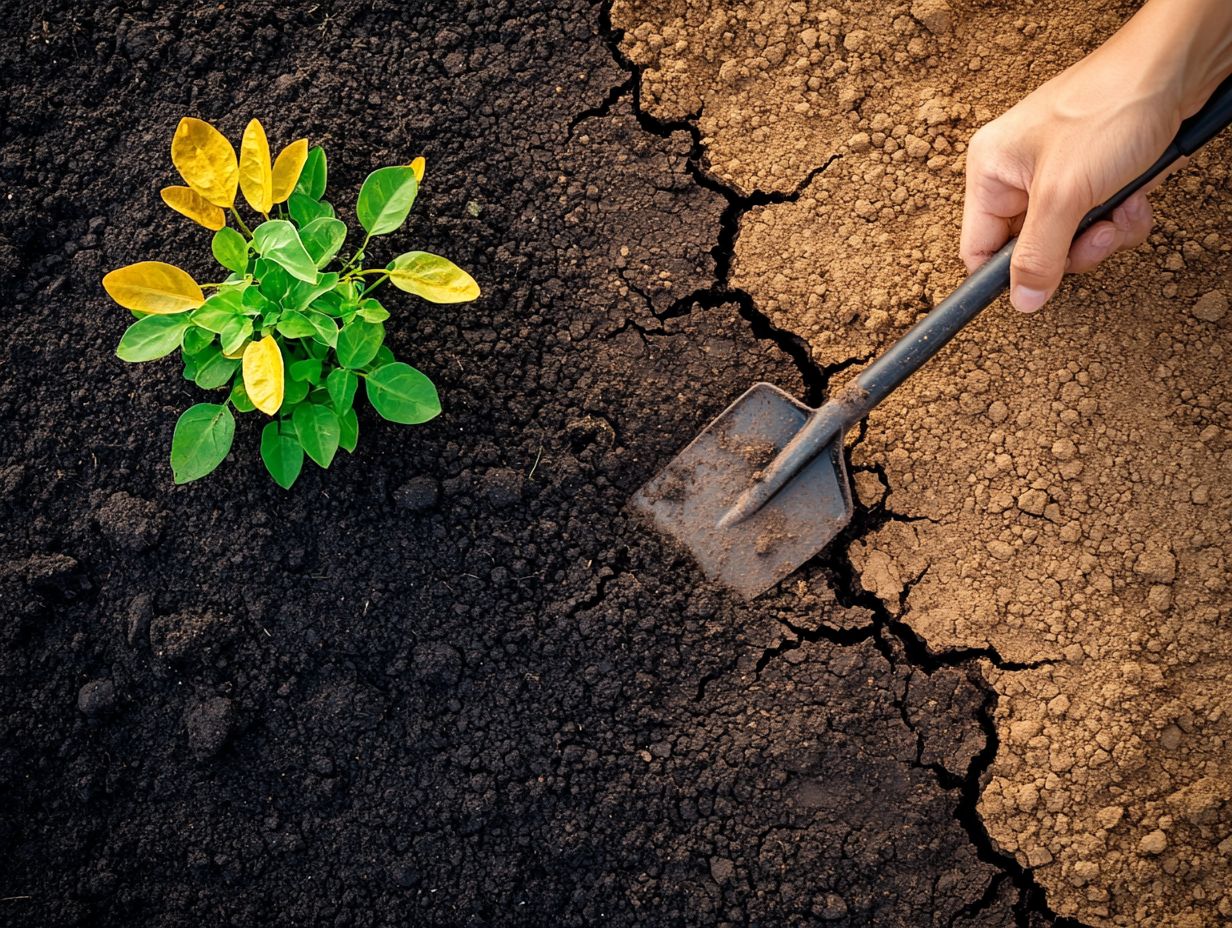
Soil testing is essential for any gardener looking to improve their garden! It offers invaluable insights into soil nutrients, pH levels, and overall nutrient availability elements that are vital for effective soil management.
This process typically involves collecting soil samples from various locations within your garden or field to ensure a comprehensive analysis of soil properties. Once these samples are processed in a laboratory, the results can unveil crucial information, such as the presence of main nutrients like nitrogen, phosphorus, and potassium, alongside micronutrients and any potential contaminants that may affect soil quality.
Equipped with this data, you can make informed decisions about necessary soil amendments. Whether that entails adding compost, lime, or specific fertilizers, these proactive steps can significantly enhance soil health. This creates a more productive and sustainable gardening environment that supports both plants and soil organisms.
What Are Some Common Causes of Poor Soil Quality and How to Address Them?
Common causes of poor soil quality include soil compaction, erosion, nutrient deficiencies, and a lack of organic matter. These issues can significantly hinder your plant growth and overall garden productivity.
These problems often stem from heavy foot traffic, insufficient crop rotation, and neglecting the health of your soil. Ultimately, these factors lead to a decline in soil fertility. To tackle these challenges, embracing sustainable gardening practices can truly transform your gardening experience.
For instance, implementing cover crops not only protects your topsoil from erosion but also enriches it with essential nutrients as they break down.
Incorporating organic amendments like compost or well-rotted manure can greatly enhance your soil structure, improve moisture retention, and boost beneficial microbial activity. This creates a thriving ecosystem that supports robust plant life, setting you up for gardening success.
What Are Some Ways to Improve Soil Quality?
Improving soil quality is essential for nurturing robust plant growth, and you can easily boost your soil quality with simple practices! Consider adding organic matter, using soil amendments, embracing composting, and employing cover crops and mulch.
By incorporating well-rotted organic materials think leaves, grass clippings, or even those kitchen scraps you usually throw away you can dramatically enhance the soil s structure and nutrient content.
Using compost not only enriches your soil but also fosters beneficial microorganisms that play a crucial role in creating a thriving ecosystem.
Implementing soil conservation methods, such as minimal tillage (disturbing the soil as little as possible) and crop rotation, can help prevent erosion and create a more resilient garden environment. These strategies encourage healthier plants and contribute to a sustainable gardening approach, extending soil longevity while reducing reliance on chemical fertilizers.
Why Is It Important to Maintain Good Soil Quality?
Maintaining good soil quality is crucial for your plant growth. It enhances soil fertility and supports natural processes like nutrient cycling that sustain healthy ecosystems all of which contribute to effective sustainable gardening practices.
Neglecting soil quality can lead to dire consequences, such as reduced crop yields and increased soil erosion, jeopardizing your entire gardening endeavor. When the soil becomes depleted and its structure deteriorates, your plants will struggle to absorb essential nutrients and water, resulting in stunted growth and diminished harvests.
Conversely, prioritizing soil health cultivates a thriving garden ecosystem. This invites beneficial organisms like earthworms and microbes to flourish. These allies not only assist in nutrient uptake but also help create a more resilient environment, capable of withstanding pests and diseases, ensuring that you enjoy a bountiful yield season after season.
Frequently Asked Questions
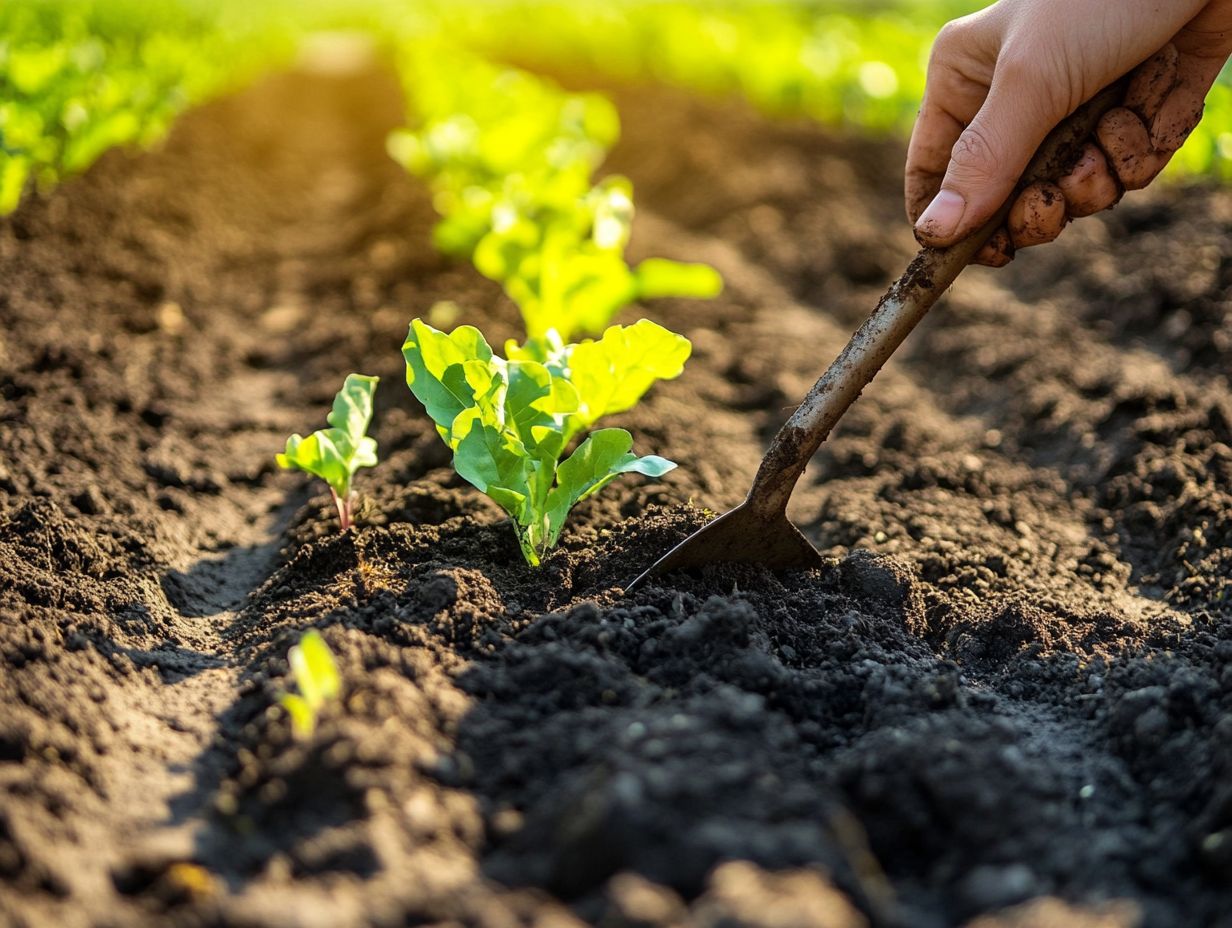
What are 5 signs that my soil needs improvement?
The 5 signs that your soil needs improvement are: compacted soil, slow draining soil, nutrient deficiencies, poor plant growth, and excessive runoff due to pest infestation.
How can I tell if my soil is compacted?
You can tell if your soil is compacted by performing a simple soil compaction test. Take a handful of soil and squeeze it tightly in your hand. If the soil stays in a ball when you open your hand, it is compacted.
Why is slow draining soil a sign of soil improvement?
Slow draining soil is a sign of soil improvement because it indicates that the soil has poor structure. This can be caused by compacted soil or a lack of organic matter. Improving the soil structure will help water to drain more easily, allowing for better plant growth.
What are some common nutrient deficiencies in soil?
Some common nutrient deficiencies in soil include nitrogen, phosphorus, and potassium. These are known as the “big three” nutrients that are essential for plant growth. Other common deficiencies include calcium, magnesium, and sulfur.
Start improving your soil today for a vibrant and thriving garden!
Why does poor plant growth signal the need for soil improvement?
Poor plant growth is a clear sign that your soil needs improvement. This issue can surface due to a lack of nutrients or compacted soil.
Act now! Improving your soil quality will give your plants the nutrients they need to thrive.
What can I do to improve my soil?
You can improve your soil by adding organic matter and testing the pH levels. Using fertilizers or soil amendments helps replenish nutrients.
Avoid over-tilling to protect soil health. Regular crop rotation prevents nutrient depletion.

